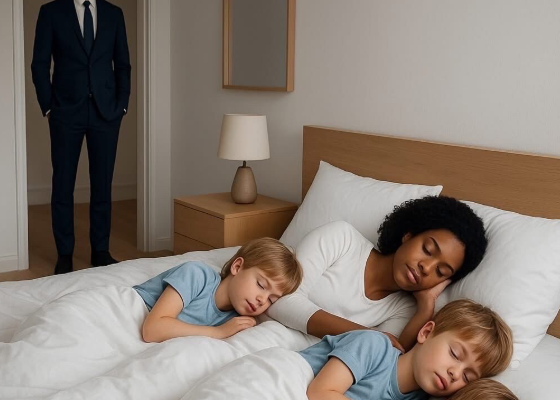 No Maid Survived a Day With the Billionaire’s Triplets, Until the Black Woman Arrived and Did What No One Could
No Maid Survived a Day With the Billionaire’s Triplets, Until the Black Woman Arrived and Did What No One Could
The sprawling mansion at the edge of the city gleamed with perfection on the outside, but inside it was chaos. Henry Marshall, a billionaire tech tycoon, lived there with his three children — identical triplets who were infamous for running off every nanny, tutor, or maid who dared enter their world.
They were only nine years old, but their reputations had spread far beyond the estate gates. Each new hire lasted mere hours before storming out in tears, clothes rumpled, patience gone. Some complained of endless pranks — sugar swapped with salt, frogs hidden in closets, paint spilled on gowns. Others admitted the triplets were simply too clever, too mischievous, and far too bonded with one another to let any outsider gain control.
For months, Henry had struggled to find help. His schedule left him little time with the children, and the mansion was beginning to feel like a battlefield. Agencies had begun refusing his calls, labeling the Marshall children “unmanageable.”
And then she arrived.
The Woman Who Walked In
Her name was Grace Thompson. She wasn’t intimidated by the stories whispered about the Marshall triplets. She had worked in homes before — sometimes with kind families, sometimes with households weighed down by privilege and bitterness. Grace was steady, with a quiet strength that radiated from her. Her skin carried the beauty of deep mahogany, and her eyes seemed to hold both patience and wisdom.
She didn’t come to the mansion dressed extravagantly or nervously clutching a résumé. Instead, she walked in with calm assurance, wearing practical shoes and carrying only a small leather satchel.
Henry, exhausted and skeptical, warned her.
“I have to be honest, Ms. Thompson. No one lasts. My kids… they’re bright, but they push people away. Don’t feel bad if you decide to leave by dinner.”
Grace simply smiled.
“Children act out when they need to be seen. Let me meet them.”
The First Encounter
The triplets — Ethan, Evan, and Emily — were waiting upstairs, already plotting. They had lined marbles in the hallway to trip her, set water balloons above the doorframe, and whispered gleefully about how quickly this new woman would flee.
But when Grace opened the door, the balloons never fell. She had paused just before stepping in, tilted her head, and said, “Nice trap. Clever. But you wasted water, and I’m thirsty. Do you mind if I drink one of these instead?”
The children froze, shocked. No adult had ever caught on so quickly. Grace plucked a balloon gently from the frame, poked it with a straw from her bag, and sipped. The children burst into laughter — real laughter, not mischievous cackles.
That was the first crack in the wall they had built around themselves.
Winning Them Over
Grace didn’t demand they behave. She didn’t scold or threaten. Instead, she gave them challenges.
When they tried to lock her in the laundry room, she emerged minutes later holding neatly folded stacks of their clothes.
When they spilled flour all over the kitchen, she handed them aprons and said, “Well, now we have no choice but to bake bread together.”
When Ethan hid her shoes, she calmly went barefoot and told him, “If you want to walk in someone’s shoes, you’d better take care of them.”
Her approach was firm but infused with love. She saw their intelligence not as a problem but as a gift. Soon, the pranks dwindled, replaced by curiosity. The triplets began asking her questions — about her childhood, her recipes, even her favorite books.
Grace taught them how to cook simple meals, how to do laundry without turning whites pink, how to sew a button back onto a shirt. More importantly, she taught them empathy.
One day, when Emily refused to share toys with Evan, Grace sat with them and told a story about her younger brother.
“When we had nothing,” she said softly, “he still shared the last piece of bread with me. Sharing isn’t about the toy. It’s about showing love.”
The room fell quiet. For the first time, the children began to see one another differently.
A Father’s Awakening
Henry, who had buried himself in work to avoid the storm at home, began to notice the changes. He came home one evening to find the children gathered around Grace, not plotting chaos but listening to her read aloud. Another night, he overheard them helping set the table, giggling as they folded napkins into animal shapes.
One morning, Emily brought him breakfast on a tray — lumpy pancakes but made with her own hands. “Grace showed me how,” she said proudly.
Henry felt something stir in him, a guilt he had ignored. For too long, he had let his fortune raise his children, thinking money and staff could replace his presence. But here was this woman, a stranger only weeks ago, doing what he could not: bringing order, peace, and love.
The Test
The real test came one stormy evening. The triplets discovered a letter hidden in their late mother’s desk, one Henry had never shown them. It was a goodbye note written shortly before she passed, filled with love and advice. The children, overcome with grief and anger, lashed out. They screamed at their father, accusing him of keeping secrets. They locked themselves in their room, refusing to eat.
Henry was at a loss, pacing the hallway with trembling hands. But Grace knocked gently on the door.
“I know what it feels like to lose someone you love,” she said through the wood. “It’s okay to be angry. But it’s also okay to let someone hold you when you hurt.”
The lock clicked. Slowly, the children emerged, eyes red and faces blotchy. Grace knelt, arms wide, and they collapsed into her embrace. She didn’t shush their cries or tell them to be strong. She simply held them until the storm within them passed.
From that night on, the children called her “Miss Grace,” not just the maid but part of the family.
What No One Could Do
In a house where no maid had survived more than a day, Grace had done more than endure. She had broken through walls of mischief and pain, teaching three brilliant children the value of love, discipline, and compassion.
She wasn’t magic. She wasn’t wealthy. She wasn’t intimidated by power. She simply understood what the triplets needed most: not another servant to clean up after them, but someone who believed in them enough to stand firm and gentle at once.
Henry, humbled, asked her one evening, “Why did you stay, when everyone else ran?”
Grace smiled.
“Because I didn’t see monsters. I saw children who needed someone not afraid of their storms.”
Conclusion
The Marshall mansion, once a place of endless chaos, became a home again. Grace’s presence shifted everything — not because she demanded perfection, but because she modeled love, patience, and resilience.
The billionaire’s triplets, once unmanageable, began to thrive under her care. And Henry, once distant, started joining dinners, laughing more, listening better.
No maid had survived a day with them. But Grace wasn’t just a maid. She was a healer, a teacher, and the missing piece the family didn’t know they needed.
And in doing what no one else could, she left a mark on their lives that wealth alone could never buy.

